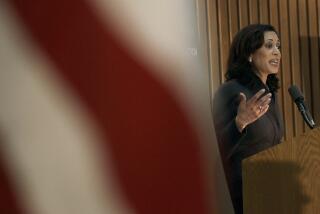Court Revives but Limits Child-Pornography Law
- Share via
WASHINGTON — The Supreme Court, ruling in a Los Angeles case Tuesday, revived a federal law against child pornography but said it can be used to punish only those who sell or distribute sexually explicit films or magazines depicting performers whom they know to be under age 18.
Two years ago, a federal appeals court in San Francisco struck down this law as unconstitutional because its wording failed to make clear that it did not apply to a video store owner--or even a Federal Express courier--who unwittingly distributes pornographic films showing underage performers.
That left federal prosecutors without the authority to bring child-pornography cases in the nine Western states, including California.
But on a 7-2 vote Tuesday, the high court adopted what one justice called a “normal, common-sense reading” of the statute so as to make it enforceable.
To be found guilty of trafficking in child pornography, a seller must know both that the “visual depiction” involved “sexually explicit conduct” and that it portrayed a minor, the court said.
Without quite admitting it, the court majority saved the statute by adopting a middle-ground position and by revising it somewhat.
The most conservative activists in the anti-pornography movement had maintained that all sellers or distributors should be held liable for selling child pornography--even if they did not know what was in the magazines, videos or photographs.
But this, Chief Justice William H. Rehnquist said, “would produce results that were not merely odd but positively absurd.” For example, a retail druggist could be charged with “distributing child pornography” simply because he returned a roll of film to a customer that contained shots of a minor engaged in sex.
On the other side, lawyers for a video dealer in Los Angeles said that the court should throw out the 1977 law entirely because it did not clearly state that prosecutors must prove a seller of pornography actually knew the performers were underage.
Rehnquist solved that problem by reinterpreting the law to require such proof from prosecutors.
“The age of the performers is the crucial element separating legal innocence from wrongful conduct” in child-pornography cases, and it must be shown that video distributors knew or had reason to know the performers were minors, he said.
Anti-pornography activists were divided on the outcome.
Patrick A. Trueman of the American Family Council hailed the ruling as a “substantial victory in the most important child-pornography case to come before the high court in more than a decade. (It) gives a green light to the Justice Department to vigorously prosecute child pornography anywhere in the country.” Trueman headed a child-pornography prosecution team in the George Bush Administration.
But lawyers for the National Law Center for Children and Families derided the court for upholding a “toothless interpretation” of the law.
“The Supreme Court all but eviscerated federal child-pornography laws” because prosecutors “now have the onerous burden of proving child pornographers actually know the (materials) contain children,” said John McMickle, the group’s legal coordinator.
Justices Antonin Scalia and Clarence Thomas dissented in the case of U.S. vs. X-Citement Video, 93-723. They said they would have struck down the law as written as unconstitutional and then hope that Congress would pass an even stricter law.
Tuesday’s outcome “leaves the world’s children inadequately protected against the depredations of the pornography trade,” Scalia wrote.
The case began in 1986 when Los Angeles police officers got a tip that a Van Nuys video dealer would sell X-rated tapes showing actress Traci Lords. News stories had revealed she was as young as 15 when she appeared in the films.
The dealer, Rubin Gottesman, agreed to mail several tapes to Hawaii, and he was arrested for distributing child pornography. He was charged and convicted under the 1977 law, fined $100,000 and sentenced to a year in prison.
But the U.S. 9th Circuit Court of Appeals threw out his conviction in 1992 because, it said, the law as written did not require prosecutors to prove a defendant such as Gottesman knew that a performer was underage.
Stanley Fleishman, the Los Angeles lawyer who represented Gottesman, said he was “not unhappy” with the ruling, even though it reinstates the conviction of his client.
“From a First Amendment perspective, it’s a good decision.”
Even though it was decided at his trial that Gottesman knew of the actress’s age, Fleishman said he will seek to have the conviction thrown out now because the indictment did not say Gottesman knew that.
More to Read
Sign up for Essential California
The most important California stories and recommendations in your inbox every morning.
You may occasionally receive promotional content from the Los Angeles Times.











